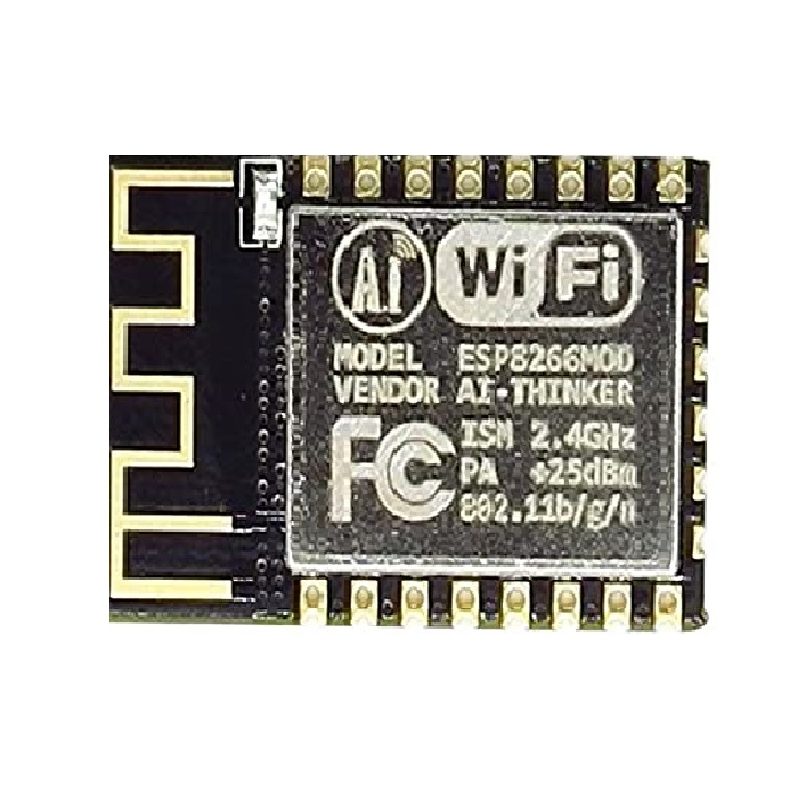ESP-12F ESP8266 Wifi IOT Module
₹110.00 (Price is Exclusive of GST)
- Communication interface voltage: 3.3V
- Working current: 240mA(MAX)
- Serial port baud rate: 115200 (default), can be modified to other values by AT command
- Serial communication format: 8N1
- Wireless Network Mode: station / softAP / SoftAP + station
- Wireless criteria: 802.11 b / g / n
- WIFI @ 2.4 GHz, support for WPA / WPA2 security mode
- +19.5dBm output power
Description
ESP-12F ESP8266 Wifi Module
The Latest ESP-12F ESP8266 Wifi Module AP & Station Remote Serial Wireless IoT Board is an integrated chip designed for the needs of a new connected world. It can handle all the necessary overhead for communicating with your network, such as TCP/IP stack and communicating with your 802.11 networks.
It is completely addressable over SPI and UART protocols allowing you to connect your sensors or project directly to it through its GPIO’s. ESP8266 is a low-cost Wi-Fi chip with full TCP/IP stack and MCU (Micro Controller Unit) capability.
ESP-12F ESP8266 Wifi Wireless Transceiver Module is a self-contained SOC with integrated TCP/IP protocol stack that can give any microcontroller access to your WiFi network. ESP8266 Serial Wifi Wireless Transceiver Module is capable of either hosting an application or offloading all Wi-Fi networking functions from another application processor.
ESP-12F ESP8266 Wifi Wireless Transceiver Module has a powerful enough on-board processing and storage capability that allows it to be integrated with the sensors and other application-specific devices through its GPIOs with minimal development up-front and minimal loading during runtime. Its high degree of on-chip integration allows for minimal external circuitry, including the front-end module, is designed to occupy minimal PCB area. The ESP8266 supports APSD for VoIP applications and Bluetooth co-existence interfaces, it contains a self-calibrated RF allowing it to work under all operating conditions and requires no external RF parts.
They are collectively referred to as “ESP-xx modules”.
It improved on the Following:
- Peripheral circuit
- The four laminates plate process
- Enhanced impedance matching
- Stronger WiFi signal output
- Anti-jamming ability
- PCB antenna redesigned after professional laboratory testing
Corresponding Interface :
- SDIO 2.0, SPI, UART
- 32-pin QFN package
- Integrated RF switch, balun, 24dBm PA, DCXO, and PMU
- Integrated RISC processor, on-chip memory, and external memory interfaces
- Integrated MAC/baseband processors
- Quality of Service management
- I2S interface for high fidelity audio applications
- On-chip low-dropout linear regulators for all internal supplies
- Proprietary spurious-free clock generation architecture. Integrated WEP, TKIP, AES, and WAPI engines
Specification
Additional information
| Weight | 20 g |
|---|---|
| Dimensions | 1 × 2 × 4 cm |
| Communication interface voltage(V) | 3.3 |
| Working current(mA) | 240 |
| Serial port baud rate | 115200(can be modified) |
| Wireless criteria | 802.11 b / g / n |










Reviews
There are no reviews yet.